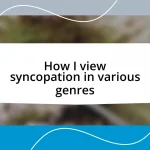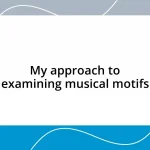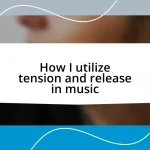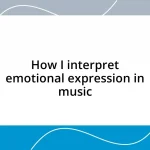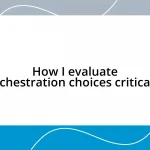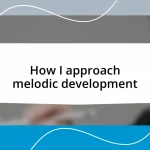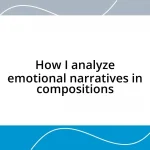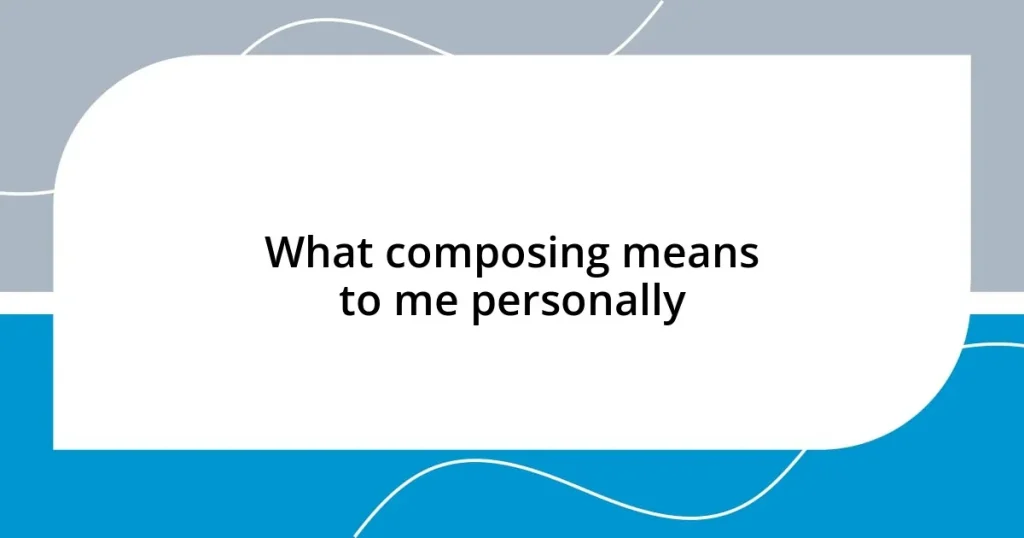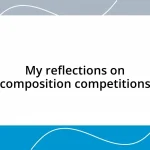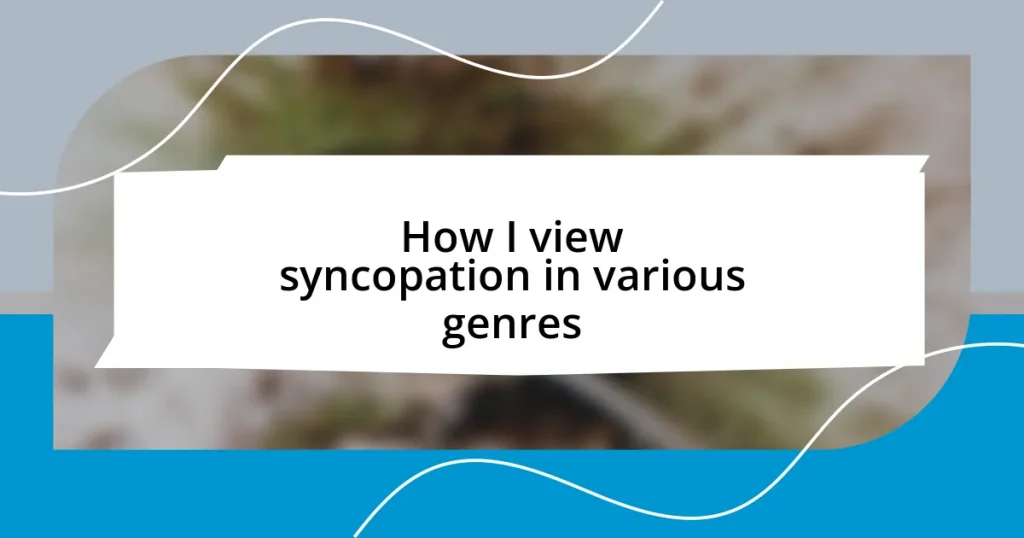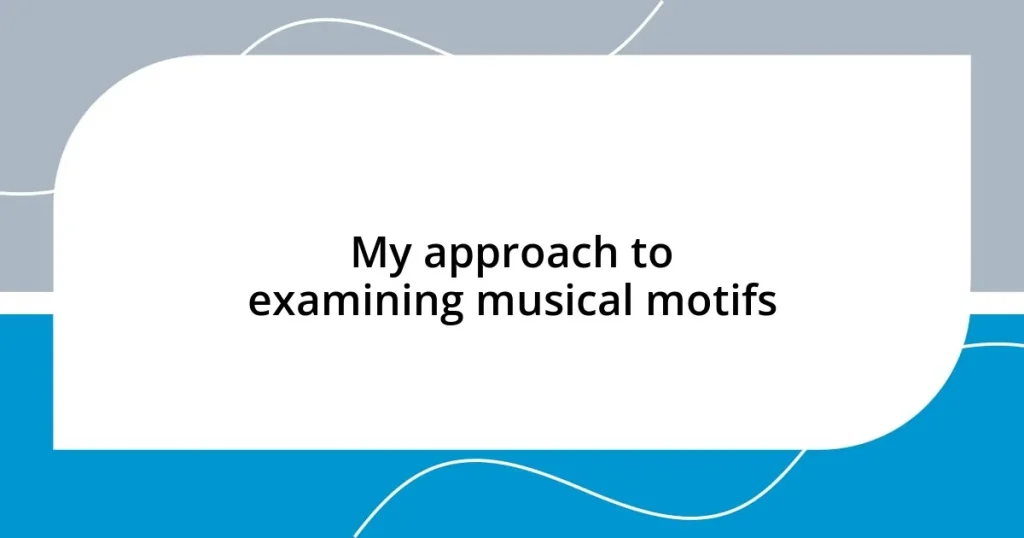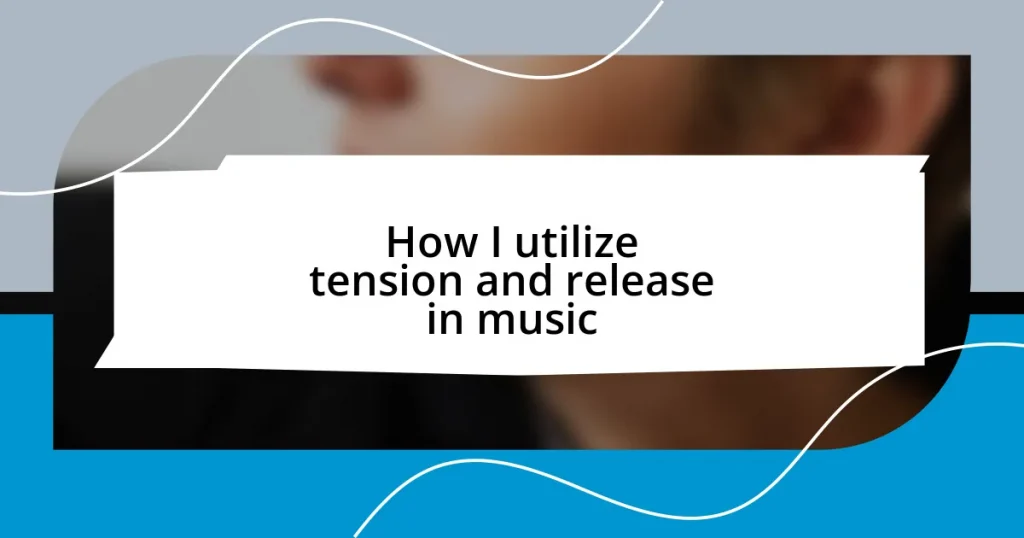Key takeaways:
- Composing serves as a personal exploration, expressing emotions that words often fail to convey.
- Key techniques for effective composition include freewriting, iterative refinement, and seeking collaborative feedback.
- Life experiences, such as family gatherings and moments of heartbreak, deeply influence the creative process.
- Sharing compositions fosters connection and growth, highlighting the value of vulnerability and constructive feedback.
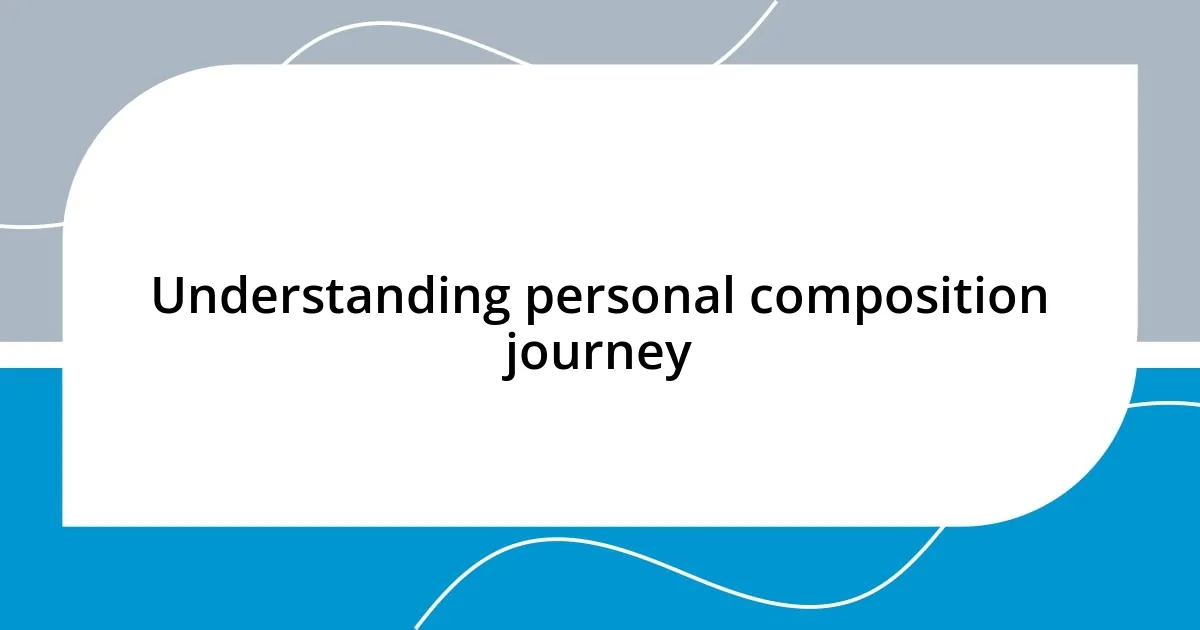
Understanding personal composition journey
I remember the first time I truly felt the magic of composing. It was a rainy afternoon, and I sat in my room, surrounded by crumpled notes and half-finished melodies. I found myself lost in a whirlwind of emotions, captured by the power of music to express what words often fail to convey. Have you ever experienced that surge of inspiration that just takes over?
As I reflect on my journey, I realize that every piece I’ve composed has been a snapshot of a moment in time, often tied to specific emotions. There were times when I poured my heart into a somber melody during a tough period, and other times I let joy burst forth in lively notes that mirrored my happiest memories. It makes me wonder: can music really serve as a map of our emotional landscapes?
What I’ve come to understand is that composing isn’t just about notes and rhythms; it’s a deeply personal exploration. It challenges me to dig beneath the surface of my experiences and articulate feelings I didn’t even know I had. Each composition is like a conversation with myself—sometimes a comforting chat, and other times a hard-hitting reality check. Isn’t it fascinating how art can reflect our inner worlds in such a profound way?
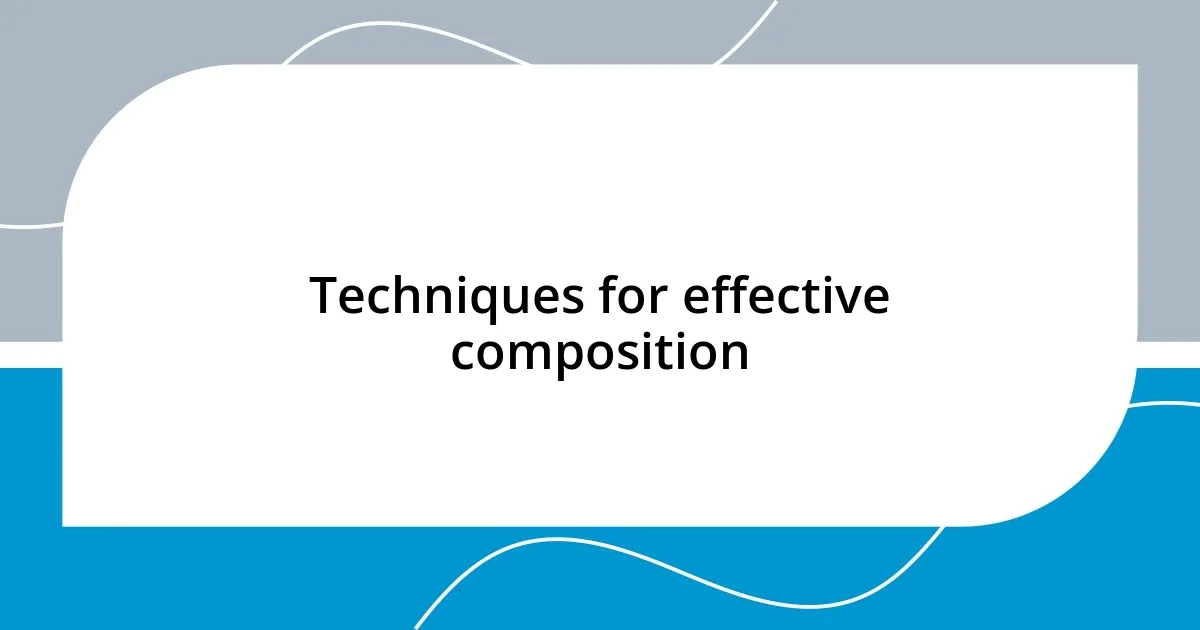
Techniques for effective composition
When I think about effective composition techniques, a few essentials stand out that have shaped my process. One technique I’ve found invaluable is freewriting. I often sit down with no particular destination in mind, allowing my thoughts to flow freely onto the page. It feels liberating, almost like a warm-up before diving into the deeper layers of a piece. Sometimes, those playful scribbles lead to unexpected musical themes that I would never have discovered through structure alone.
Here are some techniques that have helped me along the way:
- Freewriting: Let thoughts flow without judgment to spark creativity.
- Iterative Refinement: Create drafts and revisit them, allowing ideas to evolve naturally.
- Listening Actively: Immerse myself in various genres to inspire new directions and styles.
- Visual Imagery: Use descriptive images to stimulate emotions and set the mood for the music.
- Collaborative Feedback: Share my work with trusted peers to gain fresh perspectives and insights.
Through practice, I’ve learned that these techniques not only enhance my compositions but also deepen my emotional connection to the music I create. Each piece becomes a richer reflection of my journey.
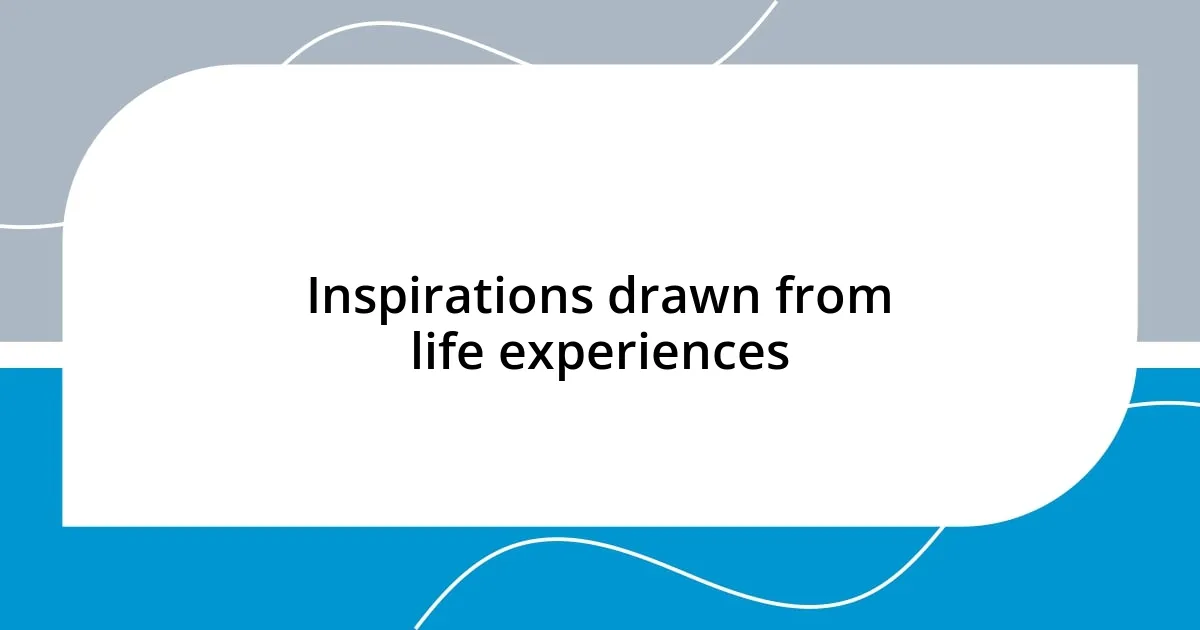
Inspirations drawn from life experiences
The moments that inspire my compositions often arise from everyday life. For instance, I vividly remember a family gathering where laughter filled the air, creating an electric atmosphere. As I sat back and observed, I began to hear a melody in the joyful exchanges, capturing the essence of that happiness. It was this experience that taught me how deeply interconnected my life moments are with my creative process. Don’t you find it intriguing how simple situations can ignite powerful ideas?
Reflecting on my travels, certain landscapes have profoundly influenced my work. I once stood atop a mountain, with the vastness of nature inspiring me to compose a piece that echoed the beauty surrounding me. I felt the rush of wind and the sun on my skin, and it turned into a symphonic representation of freedom and serenity. These experiences not only fuel my creativity but remind me to appreciate the world around me. How often do you pause to let nature inspire your art?
In moments of heartbreak, I’ve discovered an unexpected source of inspiration. After a significant loss, I found solace in composing music that reflected my sorrow. The act of translating my emotions into notes allowed me to process my grief, transforming pain into a poignant melody. It’s fascinating how some of my most profound pieces emerged from the depths of struggling emotions. Have you ever channeled your challenges into something beautiful?
| Life Experience | Emotional Insight |
|---|---|
| Family gathering | Joyful melodies capture laughter |
| Mountain landscape | Freedom and serenity unfold |
| Heartbreak | Pain transformed into poignant melody |
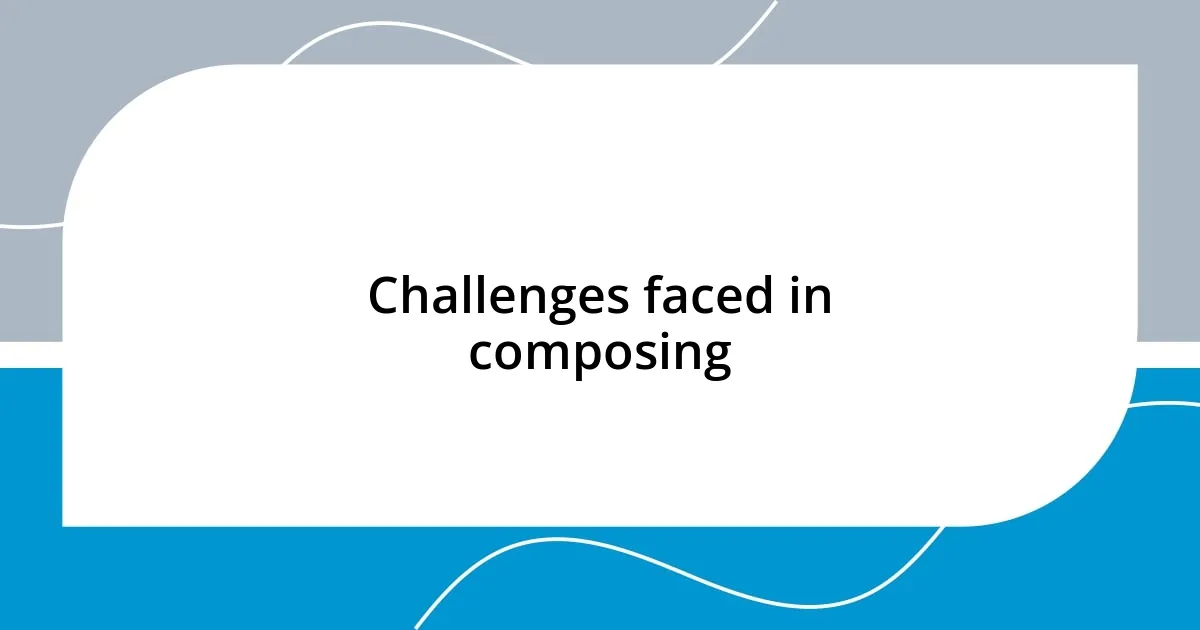
Challenges faced in composing
Composing often comes with its fair share of challenges that can test my resolve. One hurdle I face is self-doubt; it’s all too easy to question whether my ideas are worthy enough. I remember a time when I hit a creative block after receiving criticism on a piece I had poured my heart into. That moment made me wonder: How do we balance outside opinions with our inner voice? It’s a delicate dance, isn’t it?
Another challenge lies in the pressure to meet deadlines. When I rush through the creative process, I can feel my work lacking depth and richness. I once tried to churn out a complete piece in a weekend, and though the notes flowed, the essence felt forced. Reflecting on that experience, I realized that sometimes stepping back and allowing ideas to marinate can be far more rewarding than pushing through just to meet a timeline. Have you ever found yourself sacrificing creativity for time?
Lastly, I find it tough to stay motivated on days when inspiration feels elusive. There are mornings when I stare at a blank page, frustrated and uninspired. It’s during these times that I remind myself that creativity isn’t always about grand ideas. Sometimes, simply playing a few notes can reignite that spark. Have you experienced those days where you just need to play around until something clicks? It’s almost as if the act of creating itself becomes a refuge from the challenges we face.
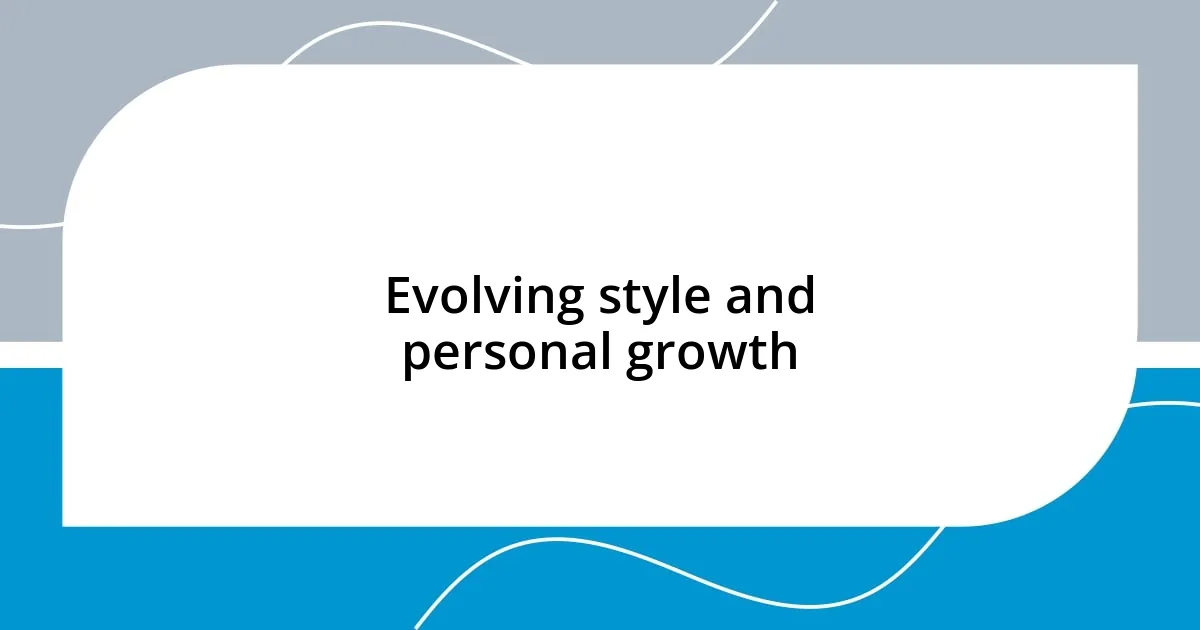
Evolving style and personal growth
Evolving my personal style has been a journey filled with trial and error. I recall a period when I embraced experimental techniques, diving into unfamiliar genres. It felt exhilarating yet daunting – like standing at the edge of a cliff. That leap allowed me to discover new facets of my creativity. Have you ever felt the thrill of breaking out of your comfort zone?
With each composition, I notice the subtle shift in my approach as I incorporate lessons from past experiences. For instance, after finishing a piece that was well-received, I surprisingly found it challenging to replicate that success. Instead of chasing perfection, I learned to honor my instincts and emotions, embracing imperfections as integral to my growth. Isn’t it interesting how our previous successes can create a pressure that’s as heavy as setbacks?
The more I compose, the clearer it becomes that my growth is intertwined with my evolving style. I remember a time I revisited an old piece and was shocked by its simplicity. However, rather than dismissing it, I took inspiration from that innocence and infused a fresh perspective. This realization brought forth a deeper understanding of how my past choices shape my present voice. Have you revisited your old work and found new meaning in it? It’s remarkable how our journey fuels our evolution.
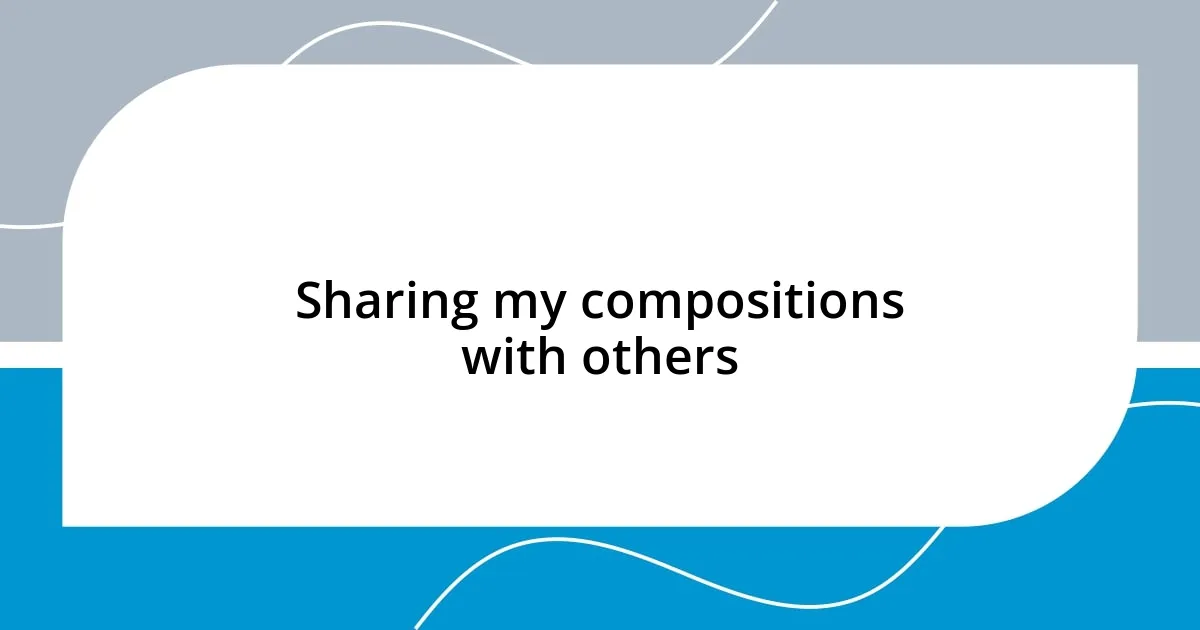
Sharing my compositions with others
Sharing my compositions with others is a deeply fulfilling experience for me. I vividly remember the first time I played a piece for my friends; their reactions turned my nervousness into a warm glow of validation. It was as if my notes had the power to connect us on a deeper level, and I often wonder how a simple melody can evoke such strong emotions. Have you ever shared something you created and felt that sense of belonging?
There are also moments when I hesitate to share, fearing the judgment that might come. Yet, I’ve learned that those fears often fade when I see my audience genuinely engaged. I recall a small gathering where I played a composition that I thought was rather flawed. To my surprise, people expressed how my music resonated with their own experiences. This taught me that vulnerability can lead to unexpected connections. Isn’t it interesting how our perceived imperfections can actually create bridges between us?
Finally, sharing my work opens doors for invaluable feedback. A few months back, a mentor offered constructive criticism on a piece I was very proud of. At first, I felt a pang of disappointment, but then I realized that their perspective helped me grow. It’s like having a mirror that reflects not just my strengths but also areas for improvement. Have you ever received feedback that, while difficult to hear, ultimately made your work stronger? I find that sharing isn’t just about showing off; it’s about learning and evolving together.

